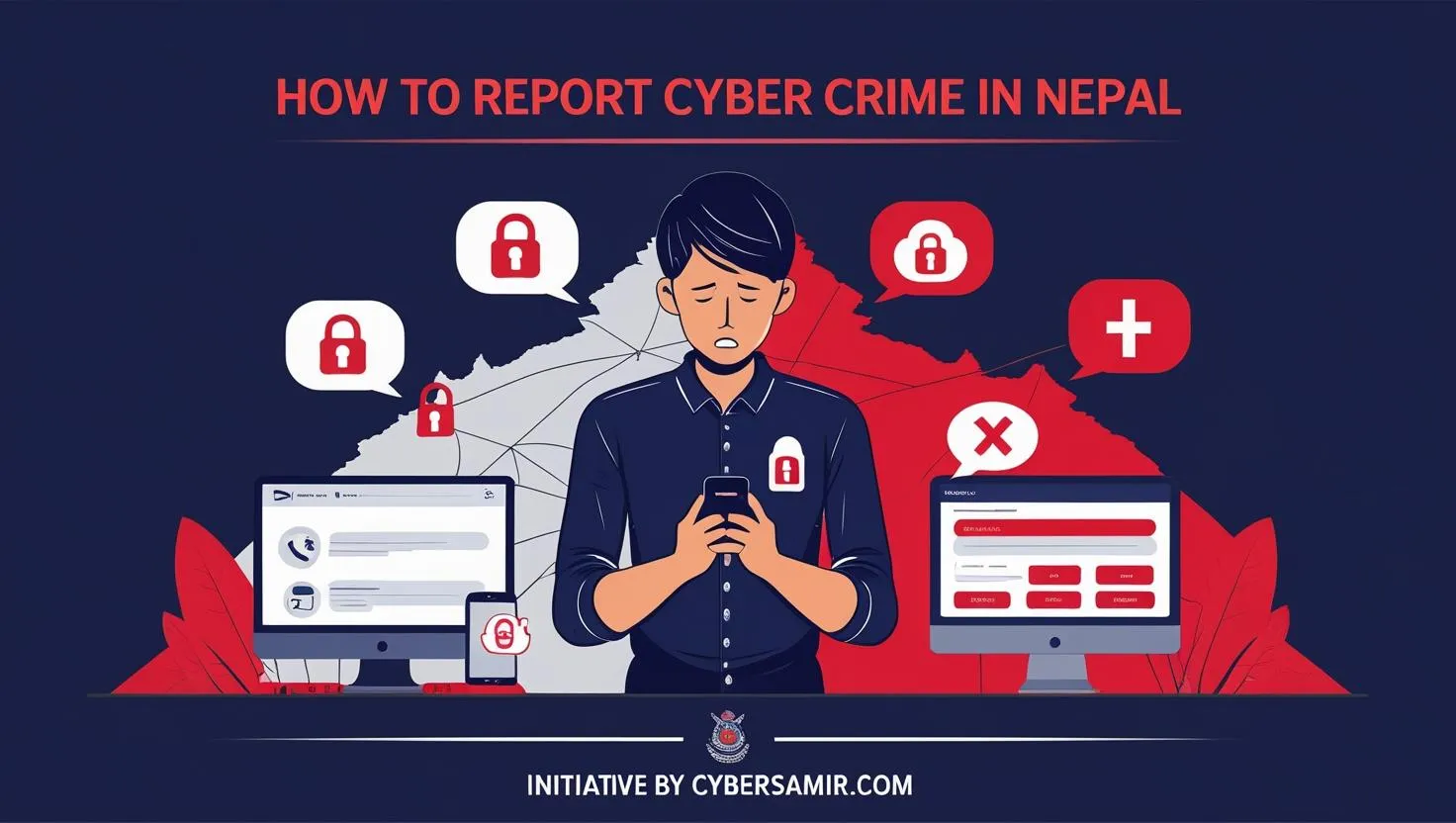
How to Report Cyber Crime in Nepal – Step-by-Step Guide
As Nepal embraces the digital age, cybercrime has become a growing concern, with cases surging from 9,013 in 2022-23 to 19,730 in 2023-24. Offenses such as hacking, phishing, identity theft, and online fraud are increasingly common, affecting individuals, businesses, and institutions. Understanding how to report cybercrime in Nepal is crucial for protecting your rights and seeking justice. This guide provides a step-by-step process for reporting cybercrimes, details the relevant legal framework, and offers practical tips to stay safe online.
What is Cybercrime?
Cybercrime refers to illegal activities conducted through digital devices or the internet, targeting individuals, businesses, or systems for financial gain, data theft, or harassment. In Nepal, common types of cybercrimes include:
- Hacking: Unauthorized access to computer systems or networks.
- Phishing: Fraudulent attempts to steal sensitive information, such as passwords or credit card details.
- Identity Theft: Using someone’s personal information for fraudulent purposes.
- Online Fraud: Deceptive practices, including fake online shopping or investment scams.
- Cyberbullying: Harassing or intimidating individuals via digital platforms.
- Malware Attacks: Distributing malicious software to disrupt or steal data.
- Publication of Illegal Content: Sharing obscene or harmful material online.
Nepal’s primary legal framework for addressing these offenses is the Electronic Transactions Act, 2063 (2008) (ETA), supplemented by provisions in the Muluki Criminal Code, 2074 (2017).
Why Reporting Cybercrime is Important
Reporting cybercrime promptly helps authorities investigate and prosecute offenders, recover losses, and prevent further victimization. In Nepal, the Cyber Bureau of the Nepal Police is the primary agency responsible for handling cybercrime cases, supported by local police stations and the Central Investigation Bureau (CIB). By reporting incidents, you contribute to building a safer digital environment and holding cybercriminals accountable.
Step-by-Step Guide to Reporting Cybercrime in Nepal
Follow these steps to report a cybercrime effectively:
Step 1: Gather Evidence
Collect all relevant evidence to support your complaint. This includes:
- Screenshots of fraudulent messages, emails, or websites.
- URLs of suspicious websites or social media profiles.
- Transaction records for financial fraud.
- Communication logs, such as chat messages or call records.
- Any other digital proof, like altered images or malware files.
Ensure that evidence is preserved without alteration to maintain its admissibility in legal proceedings.
Step 2: Contact the Cyber Bureau
The Cyber Bureau, located in Bhotahity, Kathmandu, is the central authority for cybercrime investigations in Nepal. You can report a cybercrime through the following methods:
- In-Person: Visit the Cyber Bureau to file a complaint. Bring a written application detailing the incident, including the date, time, nature of the offense, and any known suspects.
- Online: Use the Nepal Police’s official cybercrime reporting portal (available on their website) to submit your complaint and upload evidence.
- Email: Send a detailed complaint with supporting documents to cyberbureau@nepalpolice.gov.np.
Step 3: File a Complaint at a Local Police Station
If you cannot reach the Cyber Bureau directly, visit your nearest police station to file a First Information Report (FIR). Provide a written complaint outlining the incident and submit all collected evidence. The police may transfer complex cases to the Cyber Bureau for further investigation.
Step 4: Submit Required Documents
When filing a complaint, include:
- A detailed written application describing the cybercrime.
- Copies of evidence (e.g., screenshots, emails, transaction records).
- Your identification details (e.g., citizenship ID or passport).
- If filing on behalf of someone else, a power of attorney (मन्जुरीनामा) may be required.
- For minors, include a guardian’s identity and application.
Step 5: Investigation Process
Once your complaint is filed:
- The police or Cyber Bureau conducts an initial investigation to verify facts.
- If the case is complex, it may be escalated to the Cyber Bureau for specialized investigation.
- Upon finding sufficient evidence, the police may request a formal FIR in the prescribed format.
- An arrest warrant may be issued by the District Court if a suspect is identified.
- The investigation report is submitted to the District Government Attorney, who files a charge sheet in the District Court.
- Court proceedings, including bail hearings and trials, follow, culminating in a final verdict.
Step 6: Seek Legal Counsel
Consult a lawyer specializing in cybercrime to guide you through the legal process, ensure proper evidence handling, and represent you in court if necessary. Firms like Lawneeti Associates, Notary Nepal, or Prime Law Associates offer expert legal support for cybercrime cases.
Legal Framework for Cybercrime in Nepal
The Electronic Transactions Act, 2063 (2008) is the cornerstone of Nepal’s cybercrime legislation. Key provisions include:
- Section 44: Pirating, destroying, or altering computer source code is punishable by up to 3 years imprisonment or a fine of up to NPR 200,000.
- Section 47: Unauthorized access to computer systems carries up to 3 years imprisonment or a fine of up to NPR 200,000.
- Section 48: Publishing illegal content online may result in up to 5 years imprisonment or a fine of up to NPR 100,000.
- Section 50: Identity theft and email fraud are punishable under the ETA.
- Section 51: Sharing obscene content online carries penalties of up to 5 years imprisonment.
The Muluki Criminal Code, 2074 addresses privacy-related cybercrimes, such as:
- Unauthorized recording or listening: Up to 2 years imprisonment or NPR 20,000 fine.
- Photo tampering or sharing without consent: Up to 3 years imprisonment or NPR 30,000 fine.
- Electronic harassment: Up to 2 years imprisonment or NPR 20,000 fine.
The Information Technology Tribunal (2008) hears cases related to cybercrimes, while the Cyber Security Bylaw (2020) mandates security measures for telecom and internet service providers.
Penalties for Cybercrime in Nepal
Penalties vary based on the offense’s severity:
- Hacking: Up to 3 years imprisonment and/or NPR 200,000 fine.
- Online Fraud: Up to 5 years imprisonment and/or NPR 100,000 fine.
- Cyberbullying: Up to 5 years imprisonment for severe cases.
- Identity Theft: Penalties depend on the extent of fraud, often aligned with ETA provisions.
- Corporate Liability: Companies and their officers can be prosecuted if they knowingly allow cybercrimes, with fines and imprisonment as per the ETA.
Victims may also seek compensation through the courts, depending on the damages incurred.
Challenges in Reporting Cybercrime
Despite Nepal’s efforts to combat cybercrime, challenges persist:
- Lack of Awareness: Many citizens are unaware of reporting procedures or cyber risks.
- Resource Constraints: Police and judicial systems often lack specialized personnel and technical expertise.
- Cross-Border Issues: International cybercrimes require cooperation, which can be complex.
- Underreporting: Fear, shame, or ignorance prevent victims from reporting incidents.
To address these, the Nepal Police and National Cyber Security Centre (NCSC) are enhancing training, resources, and public awareness campaigns.
Tips to Prevent Cybercrime
Protect yourself from cybercrime with these best practices:
- Use strong, unique passwords and enable two-factor authentication.
- Avoid clicking on suspicious links or sharing personal information online.
- Regularly update software and use antivirus programs.
- Be cautious of phishing emails and fake websites.
- Report suspicious activities immediately to the Cyber Bureau or local police.
- Educate yourself about common scams, such as investment or rental fraud.
For more cybersecurity tips, visit the Nepal Police website or resources like hackershousenepal.com.
Where to Seek Help
- Cyber Bureau: Bhotahity, Kathmandu; Email: cyberbureau@nepalpolice.gov.np; Phone: 01-4219044 or 9851286770.
- Local Police Station: Dial 100 for emergencies or visit the nearest station.
- Legal Support: Contact firms like Lawneeti Associates (+977-9841933745) or Notary Nepal for expert guidance.
- Nepal Telecommunications Authority: Report telecom-related issues.
- National Cyber Security Centre: Access resources for cybersecurity awareness.
Cybercrime in Nepal is a pressing issue, but with the right knowledge and prompt action, victims can seek justice and protect their rights. By following the steps outlined in this guide—gathering evidence, reporting to the Cyber Bureau or local police, and understanding the legal framework—you can effectively address cybercrime incidents. Stay vigilant, adopt preventive measures, and contribute to a safer digital Nepal.
For further assistance, visit the Nepal Police Cyber Bureau website or contact a cybercrime lawyer to navigate the legal process. Share this guide to raise awareness and empower others to combat cybercrime effectively.
Disclaimer: This article is for informational purposes only and does not constitute legal advice. Consult a qualified attorney for specific legal guidance.

🔔 Subscribe to Tech Alerts & Updates
Never miss an important cybersecurity update in Nepal.


